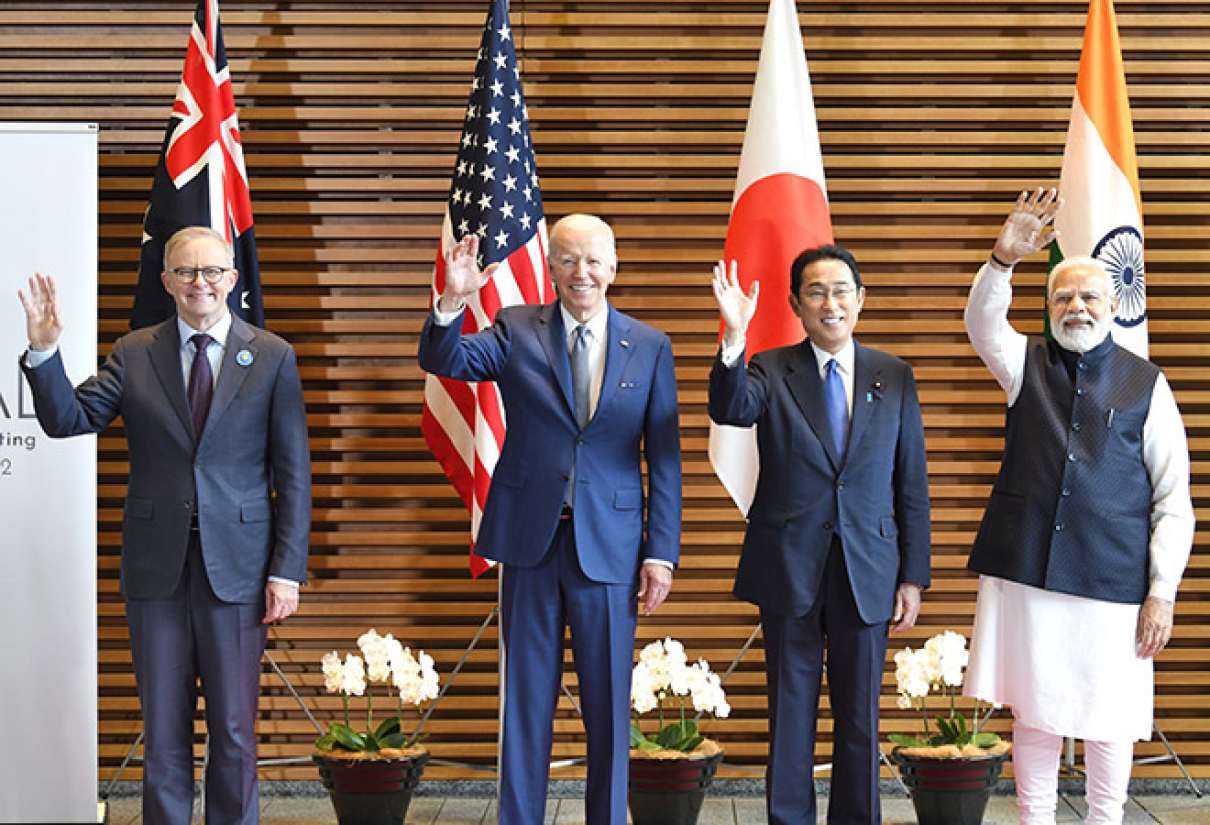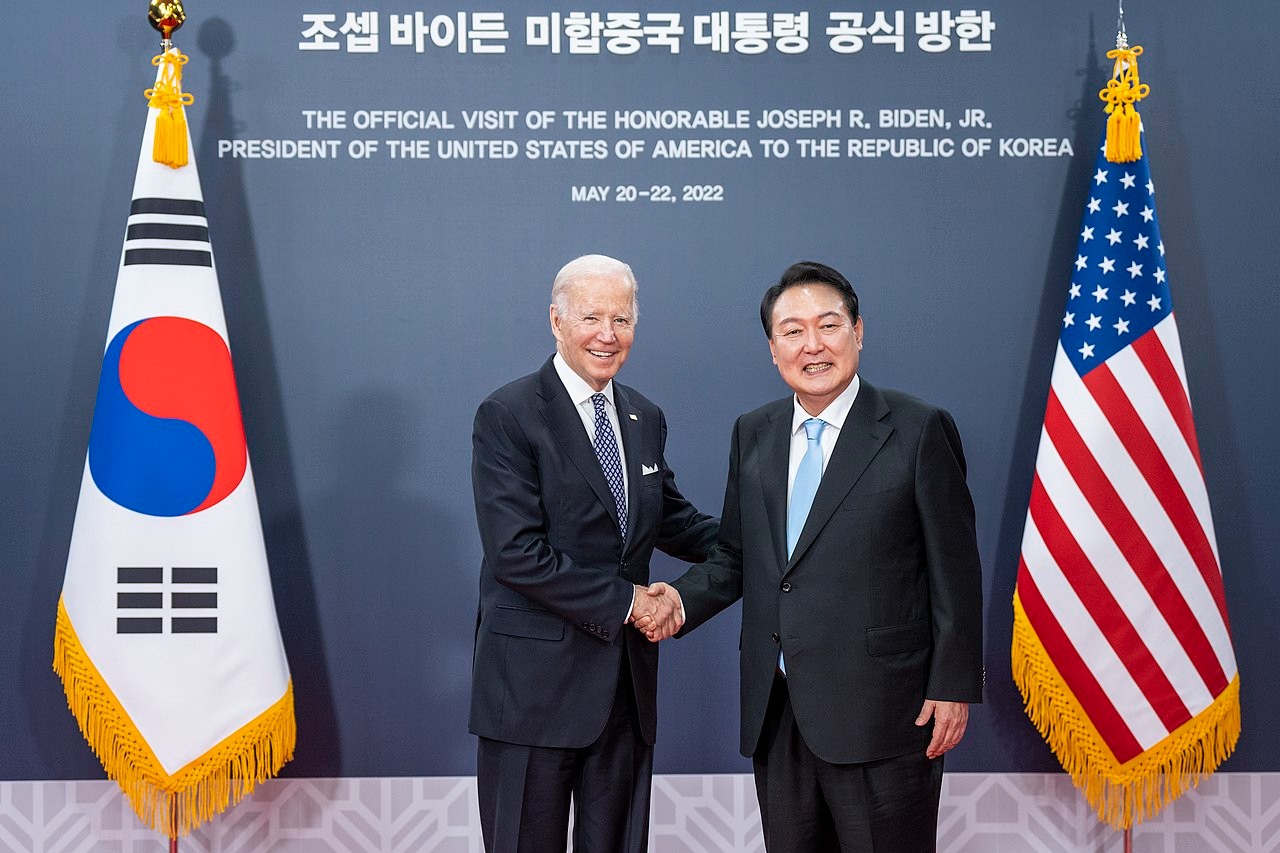Given President Yoon Suk Yeol’s keenness to the idea, more and more South Koreans now seem to be in favor of either joining formally or being associated with some working groups of the Quadrilateral Security Dialogue (Quad), one of the Indo-Pacific’s most prominent multilateral groupings comprising of Australia, India, Japan, and the United States.
Based on public opinion surveys, the just-released study by a Seoul-based leading think tank, the Asan Institute for Policy Studies, argues that the standard conclusion that only half of South Koreans support joining the Quad, while a third remain undecided, is not appropriate.
The study authored by Peter K Lee and Kang Chingku points out that the South Korean public is more positively disposed towards the Quad than what is commonly acknowledged.
It shows that most “undecided” poll respondents favor the Quad. When this ‘weak support’ is combined with those clearly in favor of the grouping, there is highly favorable support (79~80%) for South Korea cooperating with the Quad.
It may be noted that the previous Left-leaning Moon Jae-in administration in South Korea was not enthusiastic about the Quad due to sensitivities about provoking China. By contrast, the Yoon Suk Yeol administration has promised to work closely with, and potentially even join, the Quad as part of its Indo-Pacific Strategy.
Soon after he assumed office in May 2022, President Yoon said South Korea would consider joining the Quad “if invited.” According to Chang Jae-bok, the South Korean Envoy in India, Seoul is keen on joining the Quad grouping, and the ball is now in the Quad’s court to decide on expansion. “The Quad members, India, Australia, Japan, and the US, are crucial partners of Korea, and in any event, we will work closely with them.”
Originally initiated in 2007, the Quad grouping has been reinvigorated since 2017. It has a shared interest in securing a free and open Indo-Pacific. There are now regular meetings among senior foreign ministry officials and intelligence chiefs of the four member countries. But what has added real strength to it is the regular summit meetings between the President of the United States and three prime ministers of Australia, India, and Japan. There have been four such summits since US President Joe Biden’s administration began in January 2021.
The Quad is increasingly becoming a more institutionalized grouping with a broader and growing agenda. The previous global perception that it is a tool for Chinese containment is receding, thanks to the systematic attempts by the top leaderships of the four countries to project it as a forum whose goal is to “strive for a region that is free, open, inclusive, healthy, anchored by democratic values, and unconstrained by coercion.”
The Quad’s agenda has been expanded to cover non-military issues such as vaccines, climate change, critical and emerging technologies, and infrastructure. By creating working groups and meeting annually at the leaders’ level, the heads of the governments of the four countries have imbued the Quad with a flexible yet coordinated structure that seeks to deliver tangible benefits to the Indo-Pacific.
The Asan report, termed “issue brief,” says that there was significant debate during the Moon Jae-in administration about whether South Korea should join the Quad. Moon and his Democratic Party maintained that South Korea had never been invited to join the Quad and, therefore, refused to be drawn on their view of the grouping. But then, as pointed out, the Moon regime was very particular about China’s sensitivities, which has always viewed the Quad as a tool against Beijing.
Of course, towards the end of the Moon regime, there were specific hints of change in Seoul’s attitude towards the Quad. This was when Quad decided in March 2021 to explicitly embrace non-military issues such as technology, infrastructure, health, and climate change and pursue a positive, solutions-oriented agenda for the Indo-Pacific instead of an overtly anti-China orientation. In April 2021, a Ministry of Foreign Affairs official was reported to have said that South Korea was willing to cooperate with the Quad countries on an issue-by-issue basis.
However, during the 2022 South Korean presidential election, then-candidate Yoon Suk Yeol of the conservative People Power Party (PPP) argued candidly that “Seoul should willingly participate in Quadrilateral Security Dialogue working groups, consider joining multilateral, regional cooperative initiatives in phases, and take part in trilateral security coordination with the United States and Japan.” In an article published a month before his election, he stated that “South Korea should actively promote a free, open, and inclusive order in the Indo-Pacific…[and] willingly participate in Quadrilateral Security Dialogue working groups.”
Significantly, in the first eight days after his election, Yoon made phone calls to the leaders of Australia, India, Japan, and the United States, widely seen as a signal of his intent to build closer ties with the Quad. He also said he would “positively review” joining the Quad if invited.
Notably, the six “leader-level” working groups on Health and security, Climate, Critical and emerging technologies, Space, Infrastructure, and Cyber and four “official-level” working groups on Maritime Security, Counterterrorism, and Humanitarian Assistance and Disaster Relief that the Quad has devised to work on also happen to be areas under focus in the Yoon administration’s 2022 Indo-Pacific Strategy. Thus, the contributions South Korea hopes to make in upholding a free, peaceful, and prosperous Indo-Pacific closely align with the action plan of the Quad countries.
Those voicing South Korea’s active association with Quad cite many reasons why Seoul should do so. One: As a vibrant Asian democracy, South Korea shares “the Quad spirit” of freedom, democracy, human rights, and the rule of law.

Two: South Korea should leverage the combined solidarity of the Quad to deal with the security threat on the Korean Peninsula and to respond to regional security issues effectively. After all, so runs the argument; the Quad has reaffirmed its commitment to the complete denuclearization of North Korea. South Korea also needs to protect strategic supplies, such as energy resources and rare materials, coming to Korea under the freedom of navigation, another important Quad rationale.
It is to be noted that the South China Sea is a vital strategic area for South Korea, as 30 percent to 40 percent of Korean exports and 90 percent of Korean energy imports flow through this crucial maritime zone.
Three: South Korea should explore and expand new economic opportunities for the future in addition to producing semiconductors and electric batteries. Here, the Quad countries can be great partners as the combined GDP of the four Quad economies amounts to US$31 trillion, accounting for 35 percent of the global GDP.
Four: Proximity with or being a part of the Quad will widen South Korea’s strategic space by enabling it to respond to regional challenges in cooperation with Australia, India, Japan, and the United States. Networking with other US allies and regional partners will serve mutual goals and broaden Seoul’s focus beyond the Korean peninsula. It will, thus, enhance South Korea’s ability to influence the regional and global agenda positively.
Five: As the Quad agenda has shifted to focus on a broad range of non-military issues affecting the Indo-Pacific, proximity to the Quad would help South Korea gain the network power to positively impact crucial topics such as economic security, emerging technologies, vaccines, and climate change.
Six: Strengthening coordination between South Korea and the Quad countries would enable faster response to future contingencies and deter threats like economic coercion. Enhanced ties among these five countries could be a resource to meet the necessities and address the increasingly complex challenges.

The Asan “Issue Brief” has shown that more and more South Koreans are realising the merits of the Quad. “Despite a divided political view of whether South Korea should join the Quad and skewed domestic media coverage portraying the grouping as an anti-China military alliance, almost 80 percent of South Koreans have some degree of favorability towards it. We hypothesize that if survey questions asked less burdensome questions such as whether South Korea should cooperate with the Quad instead of formally joining it, or primed respondents by explaining the Quad’s working groups, support might be substantially stronger,” it says.
Based on these findings, the study makes policy recommendations, of which two are particularly noteworthy. “First, the Yoon administration needs to build a bipartisan foundation, however minimal, for Quad engagement. The survey results suggest that a substantial portion of the progressives favor the Quad. This contradicts the Democratic Party’s current policy of ambivalence towards the Quad. The Quad could be discussed bipartisanly as advancing Korea’s national interests as one more way to work with like-minded partners. Without bipartisan support, the Quad countries will inevitably question the durability of South Korea’s commitments. The Yoon administration should include opposition parties and National Assembly committees in Quad consultations”, it says.
Secondly, it recommends that the Yoon administration invest in a proper awareness campaign about the Quad. “There is widespread misinformation about the Quad as a military alliance and little awareness of its actual agenda on climate change or public health. Greater effort must be made to discuss where South Korea’s Indo-Pacific Strategy priorities best align with the Quad’s working groups”.
The idea here is to further consolidate the trend of increasing public support for the notion that by expanding its engagement with the Quad countries, South Korea can make a meaningful contribution to the peace and prosperity of the Indo-Pacific.
- Author and veteran journalist Prakash Nanda is Chairman of the Editorial Board – EurAsian Times and has commented on politics, foreign policy, and strategic affairs for nearly three decades. A former National Fellow of the Indian Council for Historical Research and recipient of the Seoul Peace Prize Scholarship, he is also a Distinguished Fellow at the Institute of Peace and Conflict Studies.
- CONTACT: prakash.nanda (at) hotmail.com
- Follow EurAsian Times on Google News




